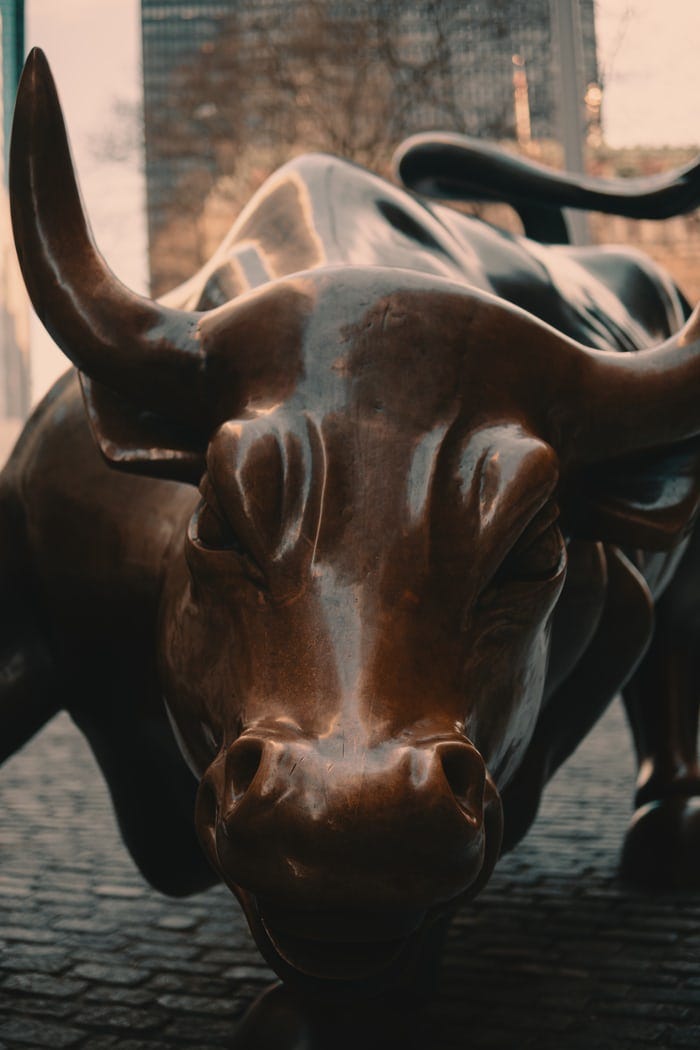The term, ‘drop’ has a different meaning to different investors.
Some interpret it as no big deal and let the markets recover on their own time and most panic sell and loose the most.
If you’re a long haul investor, a drop could mean a correction of 10–20% every few years or to a day trader it usually means 3–7% on a day to day basis.
Whatever it may be, keeping your emotions at bay and not buying high and selling low is your best bet hence why passive investing always wins.
On average, stock market corrections happen every 2 years and although this is alarming because our investments (hard earned money) is loosing value and signal the economy could be frothy, they are actually rather healthy.
Just think about it, if the stock market reached all time highs each week, that would mean almost every company would have evaluations at least 5–10x it’s market cap, stocks would be incredibly expensive and overvalued and there would be more concern about how high it can keep going until there’s a massive drop that would erase all gains for the past few years.
As we’ve seen throughout history, the stock market tends to yield positive returns year over year for most major indexes and slowly rises to keep up with inflation and demand.

Terminology
A stock market correction is simply defined as having at least a 10% drop in price.
Normal volatility is rather common and necessary. In fact since 1920 the SP500 has on average seen a 5% pullback roughly 3x a year.
Market corrections are fairly common too and happen every 16 months and throughout the last 20 yrs, a 10% drop has happened 11 times.
Bear Market (opposite of bull) this is defined as a drop of at least 20% which typically occurs every 7–10 yrs and when it does it hits hard.
As we’ve witnessed in 2020 with the coronavirus pandemic that flipped the economy upside down and the major indexes such as the Dow Jones had its worst daily drop in history of around 26%, within 5 months, the economy had made a swift recovery and set record highs which also meant leaving a staggering wealth gap behind and millions unemployed.
Last but not least a collapse is over 40% correction and through the last 120 years this only happened 3x:
In 1919, 1979 and 2009.

How To Survive Any Downturn
Whether you’re still deciding on what to do with your trades from last year’s pullback or reversal (against the trend) or concerned about what’s ahead in the markets when it comes to stocks and fixed income, understanding your personality is key.
The stock market is almost identical to playing a sport or being in the casino. You know there’s a lot at stake and you could win big or at the same time loose big if your risk to reward isn’t managed appropriately.
The reason investors loose during a crash isn’t because they picked unprofitable stocks that went bankrupt or out of business, rather due to:
-Having a big ego
-Overestimated how much they could spend
-Too on too much leverage or borrowed on margin -strongly don’t recommend
-Bite off more than they can chew
-Move their money around rather than letting it sit
If investors were more patient and thought about the future, everyone would be better off.
Most amateur and advanced investors as well lack the discipline to stick to a winning investing strategy in correcting markets because it is extremely tempting to change positions during a downfall causing even larger losses.

Besides keeping our emotions at bay and investing some time into understanding the fundamentals and our risk tolerance/ goals to seek our own individualized purpose of investing, let’s dive into the key steps you can take to still earn during a downfall of any size:
#1 Always keep a 6–12 month fund at all times
Emergencies happen and you know they will so be prepared in order to stay afloat.
It doesn’t hurt-don’t be like 40% of Americans who have less than $1k in their savings and go into debt if an unexpected $500 charge came up.
You’re better than that.
#2 Diversify Your Investments
Diversity in companies to your portfolio is key to not fall into the debt trap if your hot tech stocks fall.
Monitor your risk tolerance and don’t be too cokky. The stock market won’t save you. You must save yourself.
A recommended split to get started with investing regardless of age is 70% passive, 30% active so you can earn returns in a moderate amount of time without paying or working too much.
#3 Keep buying in-best thing you can do is just stick to your plan keep buying and holding
Especially when nearing retirement or when unemployed, it’s pertinent to reduce your exposure to market corrections since you need to better structure your investments so that when downfalls occur you aren’t forced to liquidate all your assets needing to pay tax on them to keep you afloat.
The more income sources you have, the better off you will be but in order to keep both, let’s say your job and investments in the market, allocating a more safer/conservative percentage in your portfolio in case of a downturn is key.
The potential for higher return always comes with higher risk.
#4 Don’t Panic Sell
Your emotions aren’t your friend in the markets. If your emotions control you more than you want them to, you have 2 choices:
- Hire a fiduciary/specialized portoflio manager/broker to handle trades on your behalf-worth the cost if you’re dangerous
- Don’t look, touch or time the market for the next few years. You’ll be pleasantly surprised how much that worked in your favor
#5 Keep steady income: stock market correlations also associated with job loss and or reduction in income
The best thing you can do to stabilize returns and job security is to have a job unrelated to the markets or business world. Budget always comes first for companies so if they aren’t doing well no matter if you’re the best manager, you are their first target to lay off in order for them to stay afloat.
An uncorrelated job to the market can give you that peace of mind but once again, more risk = more reward especially in the most lucrative careers which you can learn about here.
If you want to avoid risk all together, sticking to the tech world where innovation and digitalization are expanding rapidly is where the big bucks and future are found and being your own boss owning rental properties, focusing on dividend growth through stocks and not relying on a company to dictate your self worth is key.
#6 Cash Is King
Along with having a 6–12 month emergency savings account for unpredictable and random emergency expenses that are inevitable, understand when you might need cash for a planned event/situation down the road.
Maybe you’re planning a trip or a wedding and know you need a certain balance to spend and not want to have to sell your assets directly before then to afford it.
If you need money in 3–5 yrs it’s not smart to invest that cash into the market because not only will you have to pay income tax on top of it, the most strategic time period to hold a stock is for 10 years as the US markets have always made a profit over a 10 year period since 1955.
Don’t invest cash you cannot afford to loose. Cash should be put into the market through dollar cost averaging instead of through lump sums/bulk withdraws since it will help grow your nest egg faster overtime since time in the market beats everything.
Now 10 years sounds like an audacious and long time, especially when you are a first-time investor afraid of what’s coming next in the market and feel like busting the panic sell moves when you can, but staying in it for the long run with less work will yield massive returns, even larger than real estate in some cases.
Playing penny stocks, attracted to the fads/social media frenzy, going all in with one investment and leveraging up will only kill you.

Let your money work for you even during the tough times. Your money won’t suffer if you invest in it properly with applying fundamental analysis, having a cash cushion and removing any FOMO nonsense.
Just because there’s a downturn doesn’t mean it will never return and beat out expectations. More often than not, the major indexes always bounce back better than before.
Stay patient and keep earning no matter what.

